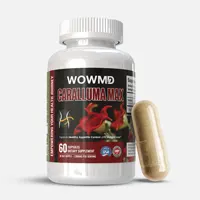CoQ10 for Migraine Prevention: Benefits & Dosage
Explore how CoQ10 helps prevent migraines, including the science behind its effects, recommended dosages, and tips for safe and effective use in migraine management.
Advertiser Disclosure: WOWMD independently vets all recommended products. If you purchase a featured product, we may be compensated. Learn why you can trust us.
You May Also Like
Popular Stories
- Superfood Greens Powder Uses & Recipes
- The Best Beef Tallow Products for Radiant Skin: A 2026 Guide
- Holy Basil : Ayurveda’s Herb for Balance, Immunity & Everyday Calm
- Best Gel Moisturizers for Hydration & Skin Care in 2026
- 7 Best Effective Supplements for Improving Bladder and Prostate Health in 2026
- 4 Best Cooling Gels for Skin and Body: Instant Refreshment and Relief
References
WOWMD follows strict sourcing guidelines to ensure the accuracy of its content, outlined in our editorial policy. We use only trustworthy sources, including peer-reviewed studies, qualified experts, and information from top institutions.
- Mitochondria. (n.d.). Genome.gov. https://www.genome.gov/genetics-glossary/Mitochondria
- Coenzyme Q10 contents in foods and fortification strategies: https://doi.org/10.1080/10408390902773037
- Coenzyme Q10: The essential nutrient: https://doi.org/10.4103/0975-7406.84471
- Antioxidant Effect of Coenzyme Q10 in the Prevention of Oxidative Stress in Arsenic-Treated CHO-K1 Cells and Possible Participation of Zinc as a Pro-Oxidant Agent: https://doi.org/10.3390/nu14163265
- A combination of coenzyme Q10, feverfew, and magnesium for migraine prophylaxis: A prospective observational study. BMC Complementary and Alternative Medicine, 17, 433. https://doi.org/10.1186/s12906-017-1933-7
- Coenzyme Q10 supplementation for prophylaxis in adult patients with migraine—A meta-analysis: https://doi.org/10.1136/bmjopen-2020-039358
- Evaluating the Role of Coenzyme Q10 in Migraine Therapy—A Narrative Review. https://doi.org/10.3390/antiox14030318
- Energy metabolism disturbance in migraine: From a mitochondrial point of view: https://doi.org/10.3389/fphys.2023.1133528
- Effectiveness of coenzyme Q10 in prophylactic treatment of migraine headache: an open-label, add-on, controlled trial: https://doi.org/10.1007/s13760-016-0697-z
- American Academy of Neurology: Neurology Resources | AAN. (n.d.). https://www.aan.com/PressRoom/home/PressRelease/185
- Combined Supplementation of Coenzyme Q10 and Other Nutrients in Specific Medical Conditions: https://doi.org/10.3390/nu14204383
- Open label trial of coenzyme Q10 as a migraine preventive: https://doi.org/10.1046/j.1468-2982.2002.00335.x
- Blood pressure lowering efficacy of coenzyme Q10 for primary hypertension: https://doi.org/10.1002/14651858.CD007435.pub3
- Coenzyme Q10 and Statin-Induced Mitochondrial Dysfunction: https://pmc.ncbi.nlm.nih.gov/articles/PMC3096178/
- Efficacy and Interaction of Antioxidant Supplements as Adjuvant Therapy in Cancer Treatment: A Systematic Review: https://doi.org/10.1177/1534735415610427
- Coenzyme Q10 Therapy: https://doi.org/10.1159/000360101
- Coenzyme Q10. (n.d.). Mayo Clinic. https://www.mayoclinic.org/drugs-supplements-coenzyme-q10/art-20362602
 Alpha Man Power Pack
Alpha Man Power Pack All-Day Fat Burn Trio
All-Day Fat Burn Trio Better Immunity Bundle
Better Immunity Bundle  Calm & Sleep Duo
Calm & Sleep Duo Cognitive Health & Vision Combo
Cognitive Health & Vision Combo Complete Weight Loss Bundle
Complete Weight Loss Bundle Core Vitality Trio
Core Vitality Trio Energy Booster Combo
Energy Booster Combo Focus Fuel Trio
Focus Fuel Trio Glow & Balance Duo
Glow & Balance Duo Health Balance Trio
Health Balance Trio Heart Care Bundle
Heart Care Bundle Joint Health Support Combo
Joint Health Support Combo Men's Immunity & Prostate Health Bundle
Men's Immunity & Prostate Health Bundle Metabolism Boost Duo
Metabolism Boost Duo Natural Skin Care Bundle
Natural Skin Care Bundle Peak Performance Duo
Peak Performance Duo Relax & Recharge Duo
Relax & Recharge Duo Skin Detoxification Bundle
Skin Detoxification Bundle Smart Energy Trio
Smart Energy Trio Stress + Energy + Wellness Combo
Stress + Energy + Wellness Combo  Total Burn Ignite Trio
Total Burn Ignite Trio Total Harmony Pack
Total Harmony Pack Workout Supplements Combo
Workout Supplements Combo









































